 Iran’s Attack on Israel
Iran’s Attack on Israel
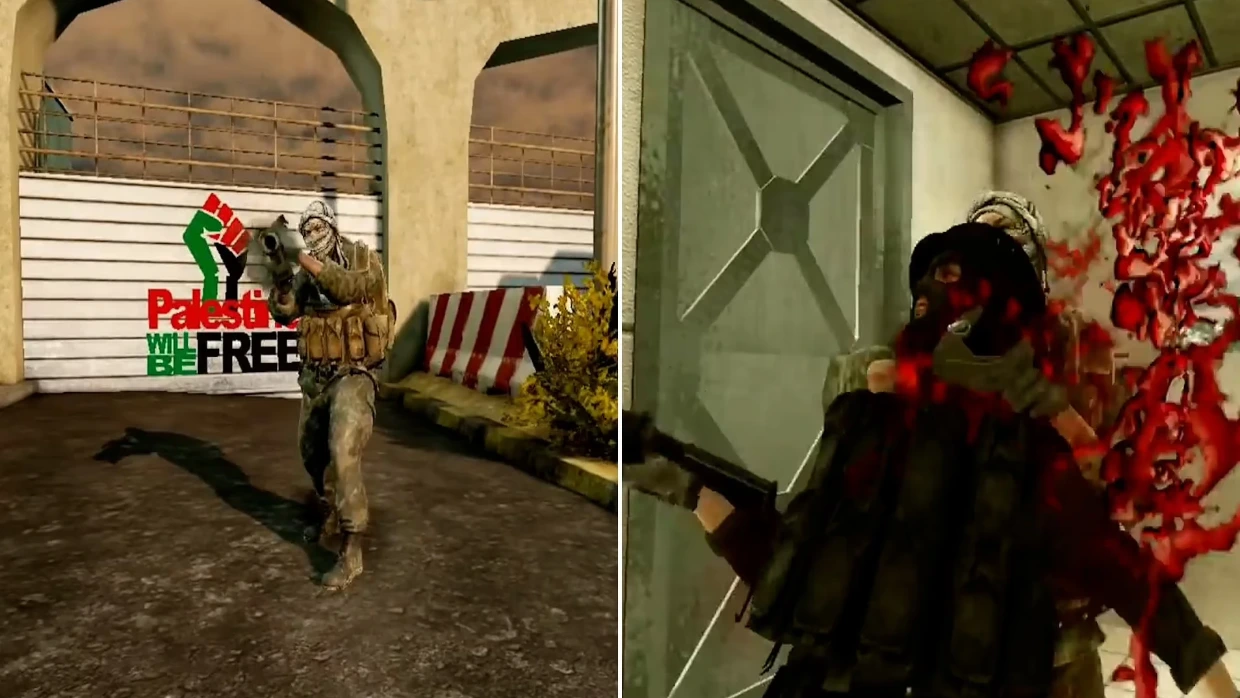

10 min read
One of the world’s most popular sources of entertainment is rife with Jew-hatred.
With antisemitism at sky-high levels around the world, many are overlooking one of the most fertile sites of growing Jew-hatred: online video games.
Ranging from the open display of antisemitic and Nazi imagery, to virtual anti-Israel rallies, to recruiting for extremist groups, some video games are full of shockingly antisemitic content.
Many people dismiss video games as frivolous or unworthy of study, allowing much of the surging hatred in online games to continue unopposed and unnoticed by policy makers, parents, and authorities. This is a big mistake. About one out of every eight human beings on the planet are active video game players, a number that’s predicted to grow. Hatred directed against Jews and others in online games is a plague that is spewing forth largely unnoticed.
Over a billion people regularly play video games worldwide. By some estimates over 90% of children play video games. The largest area of video game growth is online games, where players from all over the world mingle in virtual reality (vr) settings, competing against each other, sending messages, sometimes cooperating, and often harassing and threatening each other. The very qualities that make online games so much fun - the ability to invent new personas online and interact anonymously with people from all over the world - also allows players to introduce toxic content at times, with little to no repercussions.
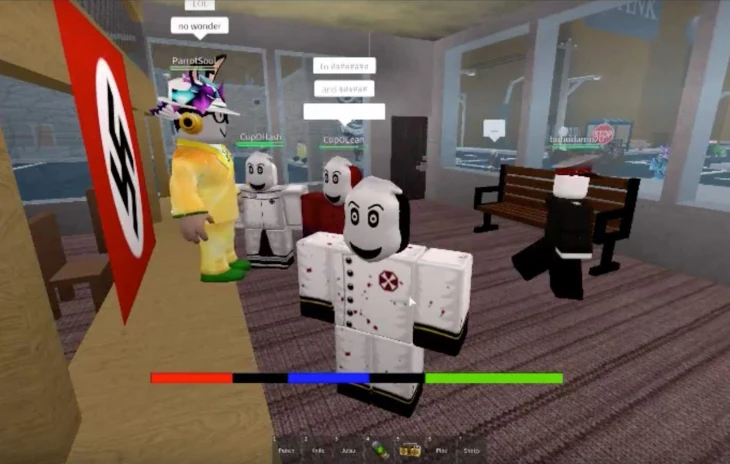
A recent report found that the vast majority of players - 86% of players in 2022 - experienced online harassment, a big spike over the last few years. One recent study found that 51% of players were exposed to hateful extremism last year. Despite Jews making up just 0.2% of the global community, much of the ire that’s filling online games is antisemitic, attacking Jews and recruiting players to anti-Jewish and other extremist ideologies or groups.
A 2021 Anti-Defamation League (ADL) study found that over a third of all gamers - 34% - reported experiencing antisemitic hate speech in the course of playing games. “In addition to Jewish people being targeted for their identity, we’re also seeing people who are denying or saying the Holocaust didn’t happen or wasn’t as bad as people say,” noted Daniel Kelley, the Director of Strategy and Operations at the ADL’s Center for Technology and Society. Misinformation, anti-Jewish slurs, hate symbols such as swastikas, and even online solicitations for funds by terrorist organizations and hate groups populate spaces in some of the most popular global games.
One of the biggest online games is Roblox, a fun, wildly popular game that has an antisemitism problem. Invented in 2006, Roblox has over 70 million active daily users. 214 million people play Roblox at least monthly; 4.6 billion accounts have been registered with the game. 45% of Roblox players are under the age of 13.
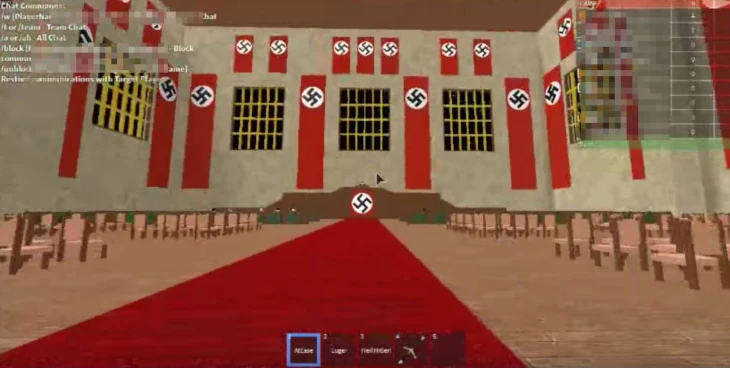
Video game journalist Cecilia D’Anastasio describes Roblox’s compelling appeal: “The game… is a hub of interconnected virtual worlds… Roblox gives players a simple set of tools to create any environment they want… They have also built spaces to hang out and role-play different characters and scenarios.” Players create any avatar they want and can strike up friendships and alliances with other anonymous players.
From the beginning, D’Anastasio notes, Roblox began to have a problem with Nazi-themed games and imagery. After going public in 2021 (with a valuation $55 billion), the game clamped down on fascist imagery. Swastikas and other Nazi memorabilia are officially banned in the game, though players still encounter these images. D’Anastasio describes a typical Nazi-themed game created by players that managed to dodge Roblox’s regulators for months, until she directed regulators’ attention to it. The game-within-a-game was called “Insbruch Border Simulator,” and allowed Roblox players to role play the part of Nazis. It received over a million visits from Roblox players before being shut down. (Nazi imagery and other hate speech is strictly prohibited on Roblox, but with tens of millions of games going on at once, some scenarios which violate Roblox’s standard inevitably escape notice.)
Soon after Hamas’ terror attacks on Israel killed 1,200, Roblox became host to pro-Palestinian marches, carried out online by hordes of martial-looking cartoon characters holding flags and filling virtual reality squares in the game. These sorts of online activities can have real effects in the real world, radicalizing kids, conditioning them to think that the behavior they see in online games is normal, and providing them with a community of like-minded peers who indulge and encourage their political extremism.
Online games can also be a site for recruitment. In December 2023, the Australian Federal Police (AFP) took the unusual step of issuing a warning that “extremists continue their attempts to recruit young people through popular chat and online forums including gaming platforms.” AFP singled out Roblox in particular, for the often violent role-playing that takes place on the site.
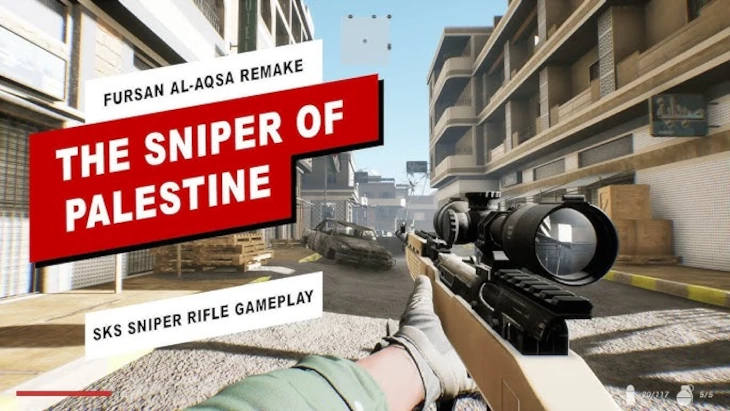
Sweden’s Psychological Defense Agency identifies online video games as a major venue for terrorist recruitment. The first step, the Agency notes, is often “forming what appears to be innocent friendships based on shared interests and grievances.” Terrorist and extremist recruiters use in-game chat rooms and messaging systems to strike up friendships with vulnerable-seeming players. Recruiters often then shift their conversations to social media outlets or to smaller, modified video games (“mods”) where hatred and violence is normalized.
The BBC singled out Roblox, Call of Duty, and Minecraft as games where hate flourished in some corners.
In 2021, the BBC studied a number of popular video games and found that some of the most popular were flooded with “anti-Semitism, racism and homophobia,” particularly in private chats within the games. The BBC singled out Roblox, Call of Duty, and Minecraft as games where hate flourished in some corners. Joe Mulhall, with the British antifascist group Hope Not Hate, explained why encountering radicalism in games is so dangerous: “You sit at home after school and play games, so the gaming element can create a sense that it’s normal, not extremist, not dangerous.” Encountering antisemitism and other hatred in a beloved game instills a sense that hatred is normal and accepted.
The experience of real-world extremists bears this out. The white supremacist who shot and killed 10 Black people in a supermarket in Buffalo, New York on May 14, 2022, left a record of his online radicalization. “I’m just saying,” he wrote on social media, “I probably would be as nationalistic (sic) if it weren’t for Blood and Iron (a gaming room) on Roblox.” .
The European Union (EU) has documented cases of real-world radicalization on popular social media forums for discussing video games, such as Discord, Twitch, and DLive. These are spaces where players can connect to discuss video games and watch each other play. Though moderators work hard to clamp down on hate speech, extremism manages to flood these spaces. “Discord has been used for the planning of offline events, including the Unite the Right rally in Charlottesville, Virginia, in August 2017,” the EU notes of the mass rally that included chants of “Jews will not replace us!” and the death of one protestor. The EU also notes that ISIS has used in-game chats to spread their beliefs.
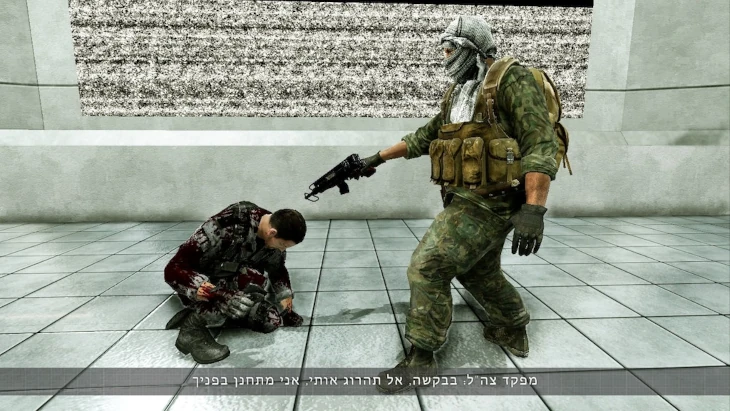 Israeli soldier pleading to Arab “freedom fighter”: “Please don’t kill me. I am begging you.”
Israeli soldier pleading to Arab “freedom fighter”: “Please don’t kill me. I am begging you.”
In 2020, the Anti-Defamation League (ADL) conducted a study of antisemitism on Steam, the popular mainstream gaming social media platform with institutional and financial links to some of the biggest video games. Even though Steam’s official position is not to tolerate hate speech, the ADL noted that “(i)t was disturbingly easy for ADL’s researchers to locate Steam users who espouse extremist beliefs, using language associated with white supremacist ideology and subcultures, including key terms, common numeric hate symbols and acronyms.” Among the comments they found were “Gas the Jew” and “Smash Jew scum.”
Some players are attracted to “mods,” modified extremist forms of mainstream games, and fringe games where hatred of specific groups such as Jews is a primary feature of play. Take the game “Counter Strike: Source,” a game based on the older video game Counter Strike. “Counter Strike: Source” has a 10 out of 10 rating and well over 100,000 reviews on the video game social media platform Steam. It’s also closely linked to real-world violence; the game is “played by nearly every known rampage killer” in Germany, notes Robert Heimberger, a state crime officer in the German state of Bavaria.
The European Union has documented extremist games with real-world consequences. “Hezbollah, for example, produced its own video game in the early 2000s,” notes the EU’s Radicalization Awareness Network in 2023, “and more recently violent right-wing groups have produced games such as Ethnic Cleansing and Heimat Defender: Rebellion.” It also notes that popular games such as Grand Theft Auto and Call of Duty have been “modded,” or modified, by extremists, notably by supporters of ISIS
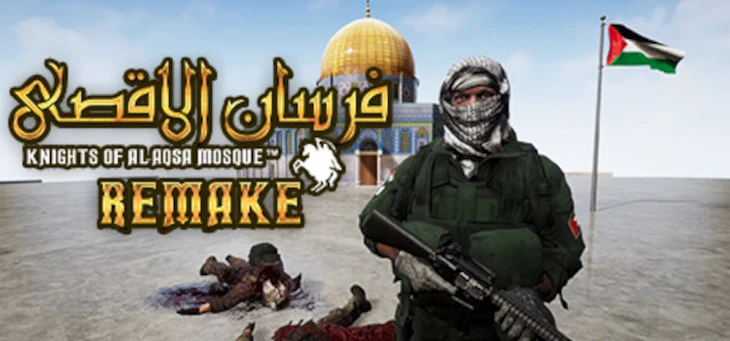
One recent game explicitly encourages players to wreak violence on Israelis. Fursan al-Aqsa: The Knights of the Al-Aqsa Mosque asks players to adopt the role of an Arab “freedom fighter” and attack Israelis using methods similar to anti-Israel terrorist groups. The game has a 9 out of 10 rating on Steam and has already been spun off into mods of its own.
In the face of so much online hatred, there are a few steps we can all take. One is educating people within video games. That was the tack that Luc Bernard, a video game designer, took when he created a virtual Holocaust museum inside the wildly popular game Fortnite in August 2023. Epic Games, Fortnite’s parent company, had recently been criticized by the ADL for allowing Holocaust denial to flourish within Fortnite. Now, Fortnite players can wander into the museum within the game, learning “about the heroes who saved Jewish lives during the Holocaust and also the Jewish members of the Resistance,” Bernard has explained: “Hate is rising worldwide and I think we need tools to make people more empathetic.”
For ordinary players, the task of countering the mountains of antisemitic content in video games and gaming chat sites can feel hopeless. Speaking up for the truth is important; so is countering misinformation when we hear it. The anonymity of online video games emboldens some players to say outrageous things. It’s our responsibility to call out hate speech wherever we encounter it, including within games.
Parents have an additional responsibility to monitor kids’ video game use. Adults don’t always realize the tsunami of abuse and hate their children might be encountering online. Talk to kids about what they’re seeing in video games. Ask specific questions including: have you seen swastikas or other hateful imagery; have you been called ethnic slurs; has anything you’ve encountered while gaming made you feel scared or upset?
Consider taking part in your kids’ games to get a sense of what they’re like. Consider setting limits to kids’ gaming, asking children to avoid games that make you uncomfortable, and setting limits to how long kids can spend gaming online.
We cannot ignore the antisemitism and hatred in online video games, one of the world’s most popular sources of entertainment. Hatred directed against gamers, ultimately, is hatred directed against us all.

Schokkend, dit artikel.
Is de wereld gek geworden?
I have experienced Jew hatred on video games, I've seen Jew hatred in video games, after Oct 7th to clear my mind and release anger and stress I got on insurgency sandstorm, and once I entered the server immediately I was attacked by voice chat by another player, and started team killing me even shouting free palastine, so I left, another day I played GTA5 I watched players search for NPCs and some NPCs in GTA5 are Hasidic Jews and started shooting and yelling free Palestine and urinated on there body's or burn them, I now stopped playing because the seeing people can hack your account and find your home through these games now and get physical addresses.
Years and years ago, as a middle schooler, I joined a public server on Minecraft. I can't even count how many offensive images I saw other people put on the server. Seeing those things scarred me. That is why I have never been on a public server since.
Thank you for this important piece!
Awakening.
The Nazis are everywhere. The vicious vermin infest everywhere these days.